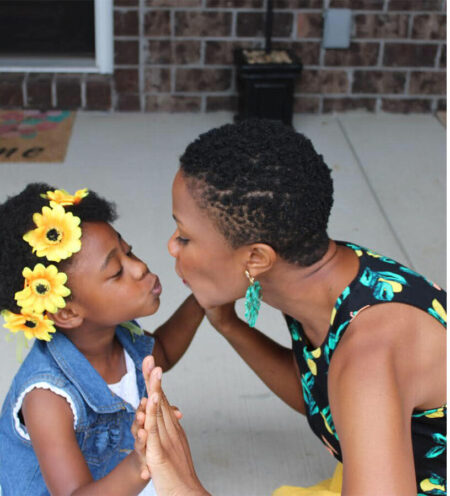The night before I chopped off my hair, I got nervous.
This decision felt bigger than me, given all the weight that Black women’s hair carries. But after three months of wearing hats and scarves in a pandemic when trips to the hairdresser felt unsafe, I walked into a salon emotionally exhausted but ready to finally see my natural hair.
I thought a few tears would fall, but, as the last of my chemically straightened hair floated to the floor like rain, I felt cleansed. Free. I laughed hysterically as I drove away from the salon.
Friends and family cheered me on virtually, but my father quietly worried about my decision. My dad grew up in the Jim Crow South, where many women straightened their hair to land jobs, husbands and respect. Before my big chop, he never said much about my hair beyond the occasional compliment, which is why I was surprised when he issued a warning.
“Watch it out there. Your hair is cut now,” he blurted when he saw me walking out of the house.
My mother heard him but remained silent. She had her own set of concerns. She was worried about me looking less professional.
I also had to help my now 4-year-old daughter understand why I decided to go natural. We’ve watched the animated “Hair Love” a million times. We’ve read books like “Happy Hair” by Mechal Renee Roe, “I Love My Hair!” by Natasha Anastasia Tarpley and my personal favorite, “Don’t Touch My Hair!” by Sharee Miller.
Still, my daughter had a hard time adjusting to my new haircut, often asking when I planned to get my hair styled again. She preferred my extensions, saying she thought I looked more like a princess that way. I gently explained that my hair is a style—and the one I choose—even if it’s not long and straight.
My family’s emotions about my hair left me tangled.
Of course, the styling of Black hair has been fraught for centuries. The CROWN Act, which passed the U.S. House in September and is now pending in the Senate, is intended to protect Black people from discrimination in schools, housing and employment based on their hairstyle. But such a law, even if passed, cannot stop bigotry, bullets and the emotional battle that comes with being a Black woman in America as seen through something as simple as our hair.
I hadn’t considered talking to my daughter about how hair could affect her personal safety until my father broke his silence. A haircut shouldn’t influence your life expectancy.
On the night of my haircut, I drove to the store more aware of how others would perceive my new look. My father, however, was more worried about my safety because my silhouette could possibly be mistaken for a Black man’s frame.
We live in the Midwest, just outside St. Louis, where natural hair still makes a statement for Black women. If my buzz cut made me look more like a Black man, would the cops in our town treat me differently? In my dad’s eyes, my femininity increased my chances of making it home safely.
His comments also led to a conversation about the intersection between racism and sexism. Without reading the crucial work of scholar Kimberlé Crenshaw and other activists, my father intuitively understood that society has placed Black women in a blind spot, where our gender and our race make us invisible in many ways.
But that space isn’t safe, is it? A Eurocentric feminine hairstyle can’t protect Black women from the many deadly forms of racism.
Police officers can see us. Since 2015, at least 48 Black women have been killed by the police. I’m guessing the style of their hair didn’t matter to the officers pulling the triggers. In the past few years, the #SayHerName campaign has put a spotlight on their killings, but society still pays less attention to the police killings of Black women. While most people have heard of George Floyd, Michael Brown and Breonna Taylor, fewer know about Kathryn Johnston, Korryn Gaines and India Kager.
In death and life, our rights and our achievements don’t seem to hold as much weight compared with those of our male counterparts or our white ones. Yet, many Black women go to great lengths to be accepted in this country.
In the past few weeks, I’ve listened to other Black women in my life vent about their hair and navigating racism. We’ve shared our fears, hair horror stories and moments of victory. I’ve come to realize that my haircut wasn’t just about changing my style. It was also about reclaiming my crown after years of letting society control it.
—Cara Anthony
From Kaiser Health News





